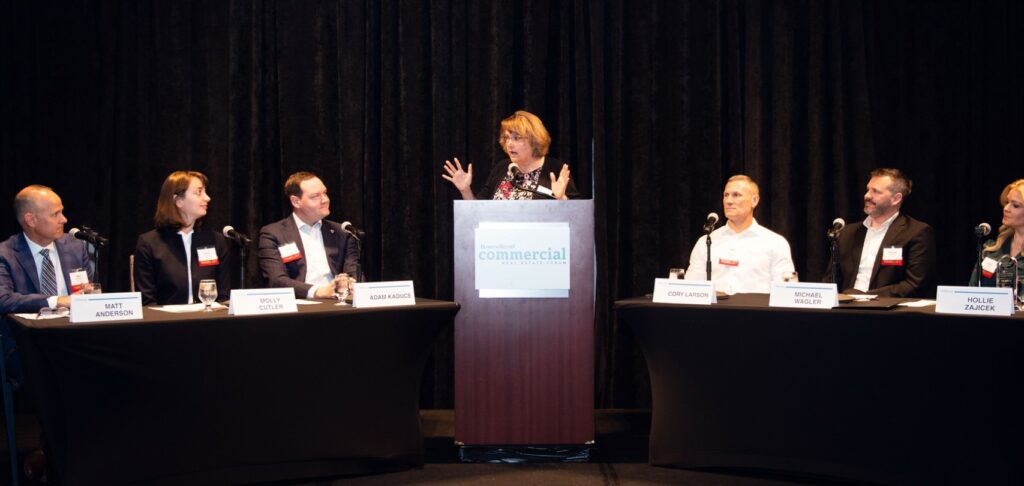Here’s how panelists describe Des Moines’ commercial real estate sector

Kathy A. Bolten Apr 26, 2023 | 7:47 am
4 min read time
925 wordsAll Latest News, Real Estate and Development, Statewide NewsA sold-out crowd of over 400 people attended the Business Record’s annual Commercial Real Estate Forum on April 19 at the Sheraton West Des Moines Hotel.
Panelists included Matt Anderson, Des Moines’ deputy city manager; Molly Cutler, a manager at Cutler Development; Adam Kaduce, president, R&R Real Estate Advisors; Cory Larson, senior vice president at Keen Project Solutions; Michael Wagler, Iowa Economic Development Authority’s Main Street Iowa state coordinator; and Hollie Zajicek, Norwalk’s economic development director.
Panelists were asked to use one word or short phrase about how they would describe the commercial real estate sector today and why. Below are their answers (edited for length and clarity).
Anderson: “The one word I would use for the Des Moines market is ‘enviable.’ We are the envy of a lot of our peer cities, which you may not know from reading the headlines. A lot of the challenges that we’re going to talk about are the result of our prosperity and growth, not necessarily because of our stagnation or backpedaling in our market, unlike a lot of other cities. We’re dealing in a crosswind where everyone else is into a very strong headwind. We have a lot to look forward to here.”

Cutler: “My word would be ‘sustainability.’ A lot of industries came out of the pandemic with an increased focus on sustainability. The commercial [real estate] sector is no different. We are seeing some announcements on some big projects, both here and across the nation, that are using more sustainable materials instead of traditional steel and concrete, even if that’s coming at an increased cost. An example is the Walmart [corporate] campus in Arkansas. They are planning to build that out of mass timber. I’m seeing the government incentivizing all-electric building systems and appliances. We’re seeing them incentivizing solar panels and geothermal for both the commercial and the single-family sectors. … In Des Moines, we’re seeing tenants from both the retail and multifamily sides starting to ask for – and being willing to pay more for – more environmentally progressive spaces. People are really starting to take a look and reevaluate the environments that they are living, working and playing in, and starting to ask more from those spaces.”
Kaduce: “My word is ‘relevant.’ Two and a half years ago, a lot of people were debating whether we would ever be in the office again. Today, as you drive around the metro, you’ll find that our largest and leading employers have full parking lots. And that’s because they’ve made the choice to bring their people back, put them around the table because they’ve decided that office space is relevant. It’s not only relevant, but it’s vitally important to the success of their businesses.”
Larson: “Optimistic. I truly believe that we are all blessed to be in the Des Moines metro area. … I’m so hopeful that interest rates provide some relief and that we’ve got a downward progression in terms of that.”
Wagler: “My phrase is ‘a world of leverage.’ … What we’re seeing [in rural and small-town Iowa] is that the downtown revitalization and real estate development ecosystem is really being stressed, and it’s being stressed in a good way. A lot of that stress is coming from new interests, new ideas, that are resulting in the purchase of many downtown buildings that have sat vacant [for a long time] or were highly underutilized for many years. So we have this new breath of life. But the other side – for good or for bad – is that there are a lot of [new] funding sources … that haven’t existed in the past and may not exist into the future, but … are driving partnerships that should have [already existed] in local communities. These funding sources, these ideas are really driving local partnerships that are reconfirming what many of us … know – in order for projects to happen, especially at a small scale, you have to learn to leverage community resources, financial resources, partnerships with the city and with financial institutions. And so that world of leverage is happening in Iowa … and I’m excited to be part of it.”
Zajicek: “My word would be ‘defiant.’ I think Iowans are very resilient and a little bit tougher than a lot of other areas in the country. After COVID, our developers, our commercial Realtors, our business owners, they said, ‘You know what, we live and work, invest and risk in a free market, in a free country. We’re going to get right back up and we’re going to start over again.’ I think that we have shown the nation that that’s how you do it after these artificial, economic issues that came up and tried to hold us back. I would say that Iowa has been able to weather the storm better than some other states in the nation and we’ll continue to do so.”
More online: Want to watch a video of the event? Click here.
Coming May 5: Panelists talked about a range of topics at the forum, including the health of downtown Des Moines, sustainable development projects, and growth in Norwalk. Read more about what panelists had to say in the May 5 Business Record.

Kathy A. Bolten
Kathy A. Bolten is a senior staff writer at Business Record. She covers real estate and development, workforce development, education, banking and finance, and housing.









